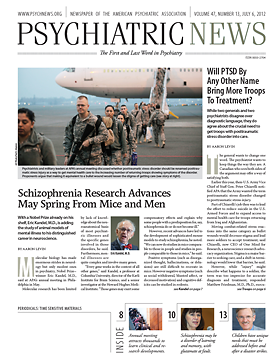Popular media typically invert the real message about violence and schizophrenia—which is that people with schizophrenia have a much higher risk of being the victim of violence, said Peter Buckley, M.D., at an APA annual meeting symposium in May on the role of psychiatrists in preventing violence.
He is a professor and chair of the Department of Psychiatry at the Medical College of Georgia. He was joined at the symposium by outgoing APA President John Oldham, M.D., Sue Bailey, M.D., and Dinesh Bhugra, Ph.D.
In his presentation, Buckley stressed that accurate prediction of violent behavior is a daunting task and that there is an interplay of societal tolerance, stigma, and clinical decision making in moderating violence among patients with schizophrenia. But he stressed that local media exposure often misinforms the public about the relationship between violence and schizophrenia.
And he said psychiatrists need to send the message that the greater risk is the other way around: that patients are more likely to be victims.
“People with schizophrenia are also the victims of violence,” he said. “Some would argue that from a media point of view we have missed the boat and that our message should be that people with mental illness and schizophrenia are more likely to be the victims of violence than the perpetrators.
“It’s a difficult message to send to the media,” Buckley said. “We need to be clear. We cannot say there is not a high rate of violence among people with schizophrenia, but it is contained to a subgroup of people with active illness. This speaks to the importance of early access to care and management of illness over time.”
Buckley reported several international studies showing that the media disproportionately report negative stories about people diagnosed with ‘‘schizophrenia’’—and in particular, equate the diagnosis with violence. But he said the actual relationship between mental illness—particularly schizophrenia—and violence is much more nuanced.
He cited a 2009 report in the Archives of General Psychiatry based on the National Epidemiologic Survey on Alcohol and Related Conditions that found that the incidence of violence was higher for people with severe mental illness, but only significantly so for those with co-occurring substance abuse and/or dependence. Statistical analyses showed that severe mental illness alone did not predict future violence; it was associated instead with historical (past violence, juvenile detention, physical abuse, parental arrest record), clinical (substance abuse, perceived threats), dispositional (age, sex, income), and contextual (recent divorce, unemployment, victimization) factors. That study is titled “The Intricate Link Between Violence and Mental Disorder: Results From the National Epidemiologic Survey on Alcohol and Related Conditions.”
Yet despite these nuances, Buckley also reported data showing that 75 percent of people think that people with a mental illness are dangerous, and 60 percent believe people with schizophrenia are likely to commit acts of violence.
“It is true that for those who are untreated in active illness and who are using substances and not taking [antipsychotic medication]—they are at a statistically greater risk of committing violence than the general population. It is equally true that when those individuals get treatment or in some instances receive treatment against their will, their illness recedes, their symptoms come under control, and correspondingly the risk of violence comes down over time.
“This is the rub of it because it becomes a balance between societal risk, autonomy of patients, and our need to provide care for people with schizophrenia.”

